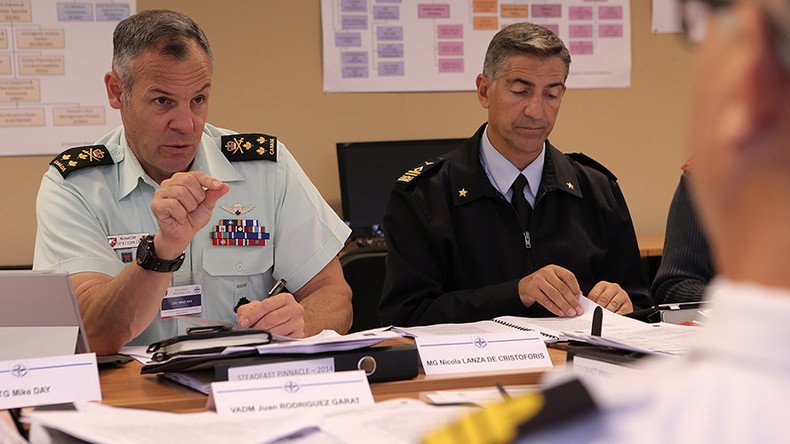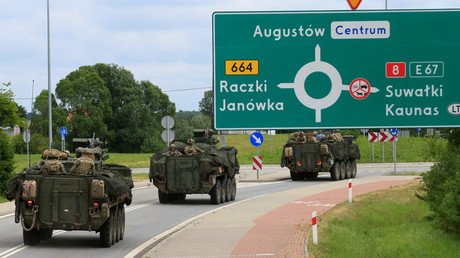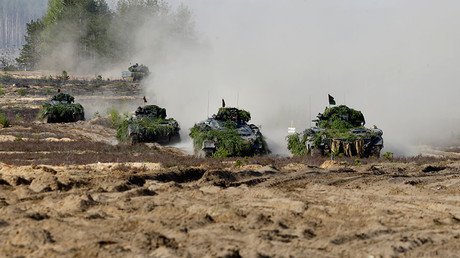Steadfast Pinnacle 2017: Dozens of NATO commanders flock to Latvia for war games

The Steadfast Pyramid 2017 military exercise kicks off in Latvia on Sunday, with 40 senior commanders from NATO states, as well as Finland and Sweden. They are expected to train how to “plan and conduct operations” amid the bloc’s buildup in the region.
Steadfast Pyramid 2017 and Steadfast Pinnacle 2017, involving more than 40 senior officers from NATO member states, plus Finland and Sweden, will take place at the Riga-based Latvian Defense Academy, the country’s national news agency LETA reported on Sunday.
Steadfast Pyramid, the first part of the exercise, will last until September 15. It is reportedly “to improve the ability of top-level officers and commanders to plan and lead joint operations,” according to LETA.
Steadfast Pinnacle, the next stage of the drill, will last from September 17 until September 22. Steadfast Pyramid and Steadfast Pinnacle were first held in Latvia in 2011.
British General James Everard, the NATO Deputy Supreme Allied Commander Europe, is expected to arrive in Latvia to oversee both stages of the exercise, Latvia’s Defense Ministry said, according to LETA.
Not much is known so far about the war games. A NATO fact sheet says Steadfast Pyramid and Steadfast Pinnacle are focused on “further developing the abilities of commanders and senior staff to plan and conduct operations through the application of operational art in decision making.”
READ MORE: US to boost air & troop presence in Lithuania during Russia-Belarus drills
Latvia, a former Soviet republic, has seen a major NATO buildup over the past months. Recently, NATO deployed four multinational battlegroups in Estonia, Latvia, Lithuania, and Poland as part of Enhanced Forward Presence (EFP). These combat-ready battlegroups, led by the UK, Canada, Germany, and the US respectively, are meant to demonstrate “the strength of the transatlantic bond.”
A 1,100-strong battlegroup led by Canada is stationed in Latvia, comprising a number of mechanized infantry units as well as a tank company and some support elements, according to NATO.
Poland and the Baltic states are calling for a stronger military presence in their countries, claiming it is necessary to deter “assertive” Russia.
Lithuania, another Baltic state, has suggested developing a “military Schengen project that would facilitate the movement of troops in Europe.”
Earlier this week, Lithuanian Defense Minister Raimundas Karoblis said the Benelux countries – Belgium, the Netherlands, and Luxembourg – as well as Finland and Estonia, support the plan, which includes “simplifying procedures and investing in infrastructure.”
Moscow has consistently said the ongoing buildup threatens Russian and European security. In mid-July, Russian envoy to NATO Alexander Grushko said the alliance is pushing forward for “an intensive mastering of the potential theater of military operations, accompanied by the development of the necessary infrastructure.”
READ MORE: Russia will respond to NATO expansion to keep strategic balance – Putin
From July to November, NATO will hold 15 drills complementing each other, “which are held in the same operative field and aimed at providing a vast range of support measures,” Grushko added.
Russian President Vladimir Putin earlier said that Moscow will not remain silent facing emerging threats on its western borders. NATO’s saber-rattling leaves Russia no other choice than to “give a suitable response to all of these actions,” he said, noting that Moscow’s countermeasures will be “much cheaper,” if not quite as technologically advanced, Putin told award-winning filmmaker Oliver Stone.














